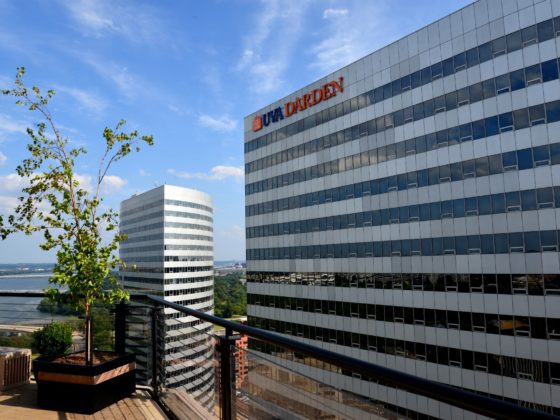Working on an Executive MBA application? Our next deadline is 1 December, with monthly deadlines thereafter. In this post, Director of Admissions Brett Twitty shares key insights and additional reading for each of the sections of our Executive MBA application.
Twitty recently hosted an Executive MBA application tips webinar. Watch the session below and read on for a section-by-section breakdown of the Darden Executive MBA application.
How the Process Works
Our Executive MBA application review consists of two stages: an initial “interview” review and a more comprehensive “final” review. In our Executive MBA application process, interviews are by invitation only, and we interview any candidate we are considering for admission. Our “final” review is when we actually make a decision on an applicant’s file, and there are three outcomes of this review: Admit, Waitlist and Deny.
The documentary requirements for these two stages are slightly different, with some implications for how you might manage your application process. Check out our recent blog post to learn more.
Additional reading: Executive MBA App Review Process – A Primer
Additional listening: Our New Executive MBA Application – Podcast Overview
Choosing Your Deadline
To create an Executive MBA application, you will first select your application type — 2020 Executive MBA (EMBA and GEMBA). After selecting an Executive MBA application, you will be presented with a menu of upcoming rounds — December 1, January 10, February 10, etc. We offer monthly deadlines, all focused on one matriculation date: August 2020 to join our Class of 2022. We encourage you to choose the round that best aligns with your application plans and timing.
We offer multiple options to give you flexibility, and for most of our classes, about half of the class applied prior to our March deadline, and about half of the class applied after our March deadline. However, as a general rule, we have more scholarship money to award and more space in our class earlier in the admissions cycle.
Additional reading: Best Time to Apply For Executive MBA
Program Information
In this section, you will indicate your format preference for Executive MBA (EMBA), Global Executive MBA (GEMBA) or both. This selection is in no way binding, and it is simply a reflection of your interests at the time of applying. In fact, our Admissions Committee will typically offer admitted students their choice of executive formats, and students confirm their format choice via our decision notification form when accepting their offer of admission.
It is also worth noting that you are applying to our Executive MBA program; not a particular format. As we recently noted, our executive formats are more integrated than ever, and our EMBA and GEMBA students mix constantly throughout the course of our program.
Additional reading: Understanding Our Exec Application: Format Selection
Additional reading: Executive MBA Program Announces New Global Updates
Personal Information
This section is fairly straightforward, but Virginia residents often ask about the Virginia In-State Educational Privileges questions. If you’ve reviewed our Tuition and Fees webpage, you’ve likely noticed that there is no overall tuition and fees differential for Virginia and non-Virginia residents. While there is a slight difference in fees (namely the program fee and the special comprehensive fee), the overall tuition and fees is the same.
So, why do we collect this information? The State Council of Higher Education for Virginia (SCHEV) requires Darden to capture this information for Virginia residents. For more information, be sure to check out the Office of Virginia Status website.
Education History
We require transcripts for all degree-related coursework. Unofficial transcripts are fine for the purposes of our application process, and most candidates will simply upload PDF copies of their transcripts with their application.
What is the difference between an “official” and an “unofficial” transcript? An “official” transcript is a transcript issued directly from the educational institution to our office. An “unofficial” transcript is a transcript issued by the educational institution to you.
All incoming executive format students are required to submit official transcripts from all degree-granting institutions prior to matriculation.
Test Scores
As you likely know, we accept a number of standardized tests in our Executive MBA application process — Executive Assessment (EA), GMAT, GRE, MCAT and LSAT. We also waive our standardized test requirement in select circumstances, and we will even accept older or expired test scores, provided you still have access to your score breakdown.
Review our Admissions FAQs webpage for additional insights about our test waiver process. You can find a link to our test waiver request form on our FAQs webpage as well as in the Test Score section of our application. As we’ve noted previously, there is no harm in submitting a test waiver request, and many prospective students will start with a waiver request in order to gain clarity about whether they will need to take a standardized test to apply to our Executive MBA program.
Choosing your standardized test? Unless you have already made significant plans to take the GMAT or GRE, we encourage you to learn more about the EA. We view the EA, GMAT and GRE as equivalent tests, and you will likely find the EA much easier to fit into your busy schedule. The EA is a 40-question, 90-minute test designed with executive format applicants in mind, and it requires on average 20 hours of preparation (versus 60-plus for the GMAT or GRE).
Additional reading: Learn About the Executive Assessment | Additional Insights About the EA
Employment History
In our application, you will list your employment history and provide a copy of your resume, and we encourage you to think about how these sections can complement one another. In the best applications, candidates use the employment history section to provide basic details regarding their roles and responsibilities, and their resumes to focus on leadership and quantifying their results and impact.
We are often asked asked about the appropriate length of resumes. For our executive format applicants, we typically recommend between one to three pages. As with all aspects of your application, make sure any information you provide adds value to your overall application. After all, sometimes more is just more.
Additional reading: Resume Guidance
Short Answer Questions
We have several short answer questions rather than one long essay, and we feel this approach offers you greater opportunity to showcase your voice and personality. It also allows our Admissions Committee to begin to get a feel for who you will be in our program. Everybody wins!
When crafting your responses, think about the narrative you are trying to advance with your application. While you could choose to think of the application process as a data dump, we encourage you to think of it as a story-telling exercise. As we’ve noted before, evaluate your application as our committee will: Holistically.
- How do all the pieces fit together?
- What are the key takeways?
- What would someone think of you based upon the information provided here
An effective application is one that leaves our Admissions Committee thinking, “This is someone we want to learn more about,” which, of course, is where our interview comes in.
Additional reading: Essay Advice
Additional reading: All About Our Short Answer Questions (Question 3 does not apply to our Executive MBA application)
Additional reading: Advancing Your Narrative
Recommendations
In our Executive MBA application process, we require one recommendation, but we will accept up to three recommendations. Our recommendation process is entirely electronic, and it consists of a ratings grid and three basic questions (as opposed to a formal letter).
Once you have completed your portion of the application, go ahead and submit your materials. Your recommendation(s) will automatically associate with your application as they are received, and you will receive an email notification once your recommender submits their recommendation.
Additional reading: Recommendations Advice
Additional Information
Before you submit your application, take a moment to think about your application holistically. Are there any gaps or ambiguities in the information provided? Consider using the Additional Comments section of your application to provide additional context, if necessary. The Additional Comments section is not an additional essay, just a place to connect the dots.
Our advice is to be brief, make your point and provide action items if appropriate. Be mindful that we are reading many, many applications, so anything you choose to share should be valuable to both you and our Admissions Committee.
Company Support Letter
The company support letter is not an application process requirement, but rather a prematriculation requirement. While we make it possible for you to include your company support letter with your materials at the time of applying, you are welcome to wait to submit this document after you receive a decision.
At a minimum, your support letter should indicate that your company is aware of your interest in the program and acknowledge the time commitment the program requires.
Additional reading: Executive MBA Application Process (See Item No. 9)
Interview
We require an interview for any candidate we are considering for admission, and in our Executive MBA application process, interviews are by invitation only. We offer both in-person and Skype interviews, and we encourage candidates to choose the format that best fits their schedule.
Our interviews are conversational in nature, and they allow us to assess characteristics that are not easily gauged from the application alone. For example, interpersonal and communication skills, rationale for an MBA, why Darden, etc.
Our interviews are also “blind,” meaning your interviewer will not know much about you other than your name. During your interview, you will have about 30–35 minutes to tell your story, and we encourage you to practice your narrative with a friend or colleague in advance of your interview. You should be prepared to talk about your background (personal, educational, career), why you want get an MBA, why you are interested in Darden, your post-MBA goals, your hobbies and interests, as well as any substantive leadership and global experiences. The more you know!
Additional reading: Interview Tips
Good luck, and we look forward to receiving your application! If you have any questions, we invite you to schedule a conversation and connect one-on-one with a member of our Admissions Committee.





